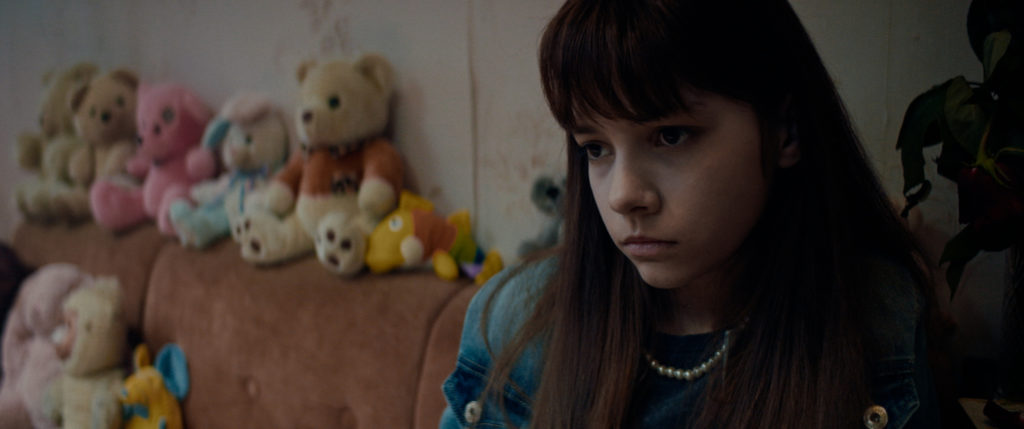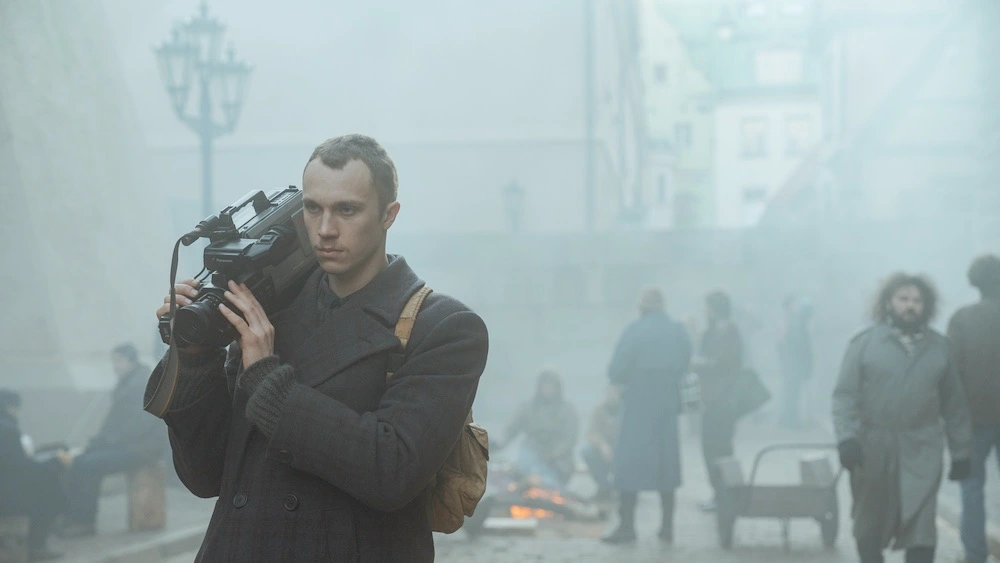
The Boston Baltic Film Festival runs from Friday, 3/3 through Sunday, 3/5 at the Emerson Paramount Center, and through 3/19 virtually. Click here for the schedule and ticket info, and watch the site for Joshua Polanski’s continuing coverage!
Linda Olte’s feature debut, Sisters, might be the most endearing film from this year’s Boston Baltic Film Festival—at least of the films I’ve seen so far. But it’s also painful (in the best of ways). Recently awarded the “Best Director of a Feature Film” at the Lielais Kristaps (Great Kristaps), the Latvian equivalent to the Academy Awards, Sisters is one of the festival’s most essential films. Don’t miss it.
A conservative Christian American family wants to adopt two teenage sisters in a Latvian orphanage, the thirteen year old Anastasija (Emma Skirmante) and eleven year old Diāna (Gerda Aljēna), a decision the two sisters share different opinions on. Though it’s considered a miracle that a family would want to adopt two teenagers, Anastasija rejects the “miracle” and seeks what appears to be an impossible reconciliation with her birth mom, a financially and emotionally unstable ex-convict.
Shot mostly in handheld by Aleksandrs Grebņevs and with a pretty low-key score from the Italian composer Federico Campana, the filmmaking is unobtrusive and almost documentary (not unlike Hirokazu Kore-eda). The handheld camera emphasizes the craziness of the group home and the uneasiness in which Anastasija carries herself as an adult at the young age of 13, but most of the time, even though life is bitter, she seems to belong here. For the better part of the runtime, maybe a homemade family video is a better description of the film’s well-suited soft and homely style, which helped this viewer sympathize with Anastasija and her desire to make things work in her home country. At the same time, the scenes with the American family, who spend three weeks in Latvia getting to know the girls, feel equally warm and homely, making the choice Anastasija faces all the more dreadful. Sometimes they are even too inviting, occasionally demonstrating cultural ignorance and Protestant performativity.
In perhaps the film’s strongest scene, Diāna stoically recalls her earliest memory: being burned on her leg by her father, whom her mother subsequently murdered. This is a key moment in the film, I think, since it reveals something honest about the birth mother, whom we only see at her worst—a place she was brought to through her time in prison, after defending her youngest child from fatherly abuse; the mother (Iveta Pole) trashes her own life, on a moment’s notice, for the sake of her child’s. Anastasija, now masking the trauma with snottiness, recalls the crime clearer than her younger sister—making the two differing opinions on a new start a bit more understandable. One can’t just sweep away such foundational memories.
Sisters reminds me of Park Ri-woong’s The Girl on a Bulldozer, one of my favorite films from last year. Like Park, Olte’s young characters don’t just know that life sucks but they feel it materially, emotionally, and perhaps even spiritually. The young (female) characters of both films struggle to maintain the status quo of their admittedly unfortunate worlds. The final shots of both films, equally genius and memorable, show the characters making somewhat analogous decisions to alter their own lives in what appear to be largely negative ways and then recede into the abyss of their own lives. The Girl on a Bulldozer ends with, well, the inevitable outcome of a girl on a bulldozer; Sisters ends likewise with the only possible ending the film ever had—though I’ll spare you the details here so you can see it yourself.

In what’s likely to be the most timely narrative feature film of this year’s festival, veteran director Viesturs Kairišs uses his own college years, as a struggling filmmaker with an equally struggling love life, to glimpse into the events of January, 1991. The personal touch guides what could have been a typical siege film or generic war film, likely to focus on more important figures, into something more relatable and perhaps reflective of the experiences of the people who lived it. “I wanted to tell the story how I remembered it,” recalled Kairišs at the festival’s in-person screening.
For Latvians, these formative events need no summary. The events of that January were simply foundational. But, to recap that pivotal month for those who may be less familiar, after freedom had been declared from the Soviet Union, Latvia anticipated a reactionary takeover attempt from the OMON, the special communist police force. After seeing the blood spilled in neighboring Lithuania, the general populace built strategic barricades to impede Soviet advances, especially in Riga. The conflict is colloquially known as “The Barricades.”
Kairišs, through his dorky avatar Jazis (Karlis Arnolds Avots), is hardly anything more than an aspiring filmmaker. His political loyalties seem somewhat unsure and his father remains a communist (though sympathetic to the Popular Front). As a cinematographer, Jazis’s eyes are naturally drawn to wide-open landscapes and still frames; and, as an editor, he prefers to do very little. The geo-politically induced problem for him is that films like his are not meant for times like the one Latvia has found itself in. Times like these call for stronger, more action-oriented political films. In one scene, the real-life (1950-1992) Latvian documentarian Juris Podnieks (played by Juhan Ulfsak) all but tells Jazis that his films are boring and that there’s not enough going on in the frame. It needs more action, it needs something to happen.
Two of my favorite scenes involve awkward sexual images. In the first, in an acting class, a perverted instructor makes a female student charade as a cat drinking a bowl of milk. Predictably, her brief performance is marked by sexual energy—although, in a very icky, awkward sort of way. Anna (Alise Danovska) calls out the professor’s perversion—which somehow initiates a romantic incursion with classmate Jazis. The scene tells you everything you need to know about all of the key characters, while also communicating what kind of film January won’t be. In the second, an awkward sex scene between Jazis and Anna, a mix of emotions flurries simultaneously. They clearly are aroused by each other, though simple desire doesn’t guarantee good sex. “That’s it?” Anna lets out between box spring squeaks. Yet, somehow it’s still sexy? It’s one of the most awkward yet intimate moments I’ve seen so far in the 2020s—right up there with the interrupted make-out session in The Fabelmans (2022).
One somewhat confusing aspect of the script is that Jazis casually namedrops canonical filmmakers like Andrei Tarkovsky and Werner Herzog to evoke his own comparable cinematic passion or to increase the weight of his dreams despite the fact that neither the films of Jazis nor January have much in common with any of these directors. I don’t mean that as an insult; I think January is a good film. But the filmmakers referenced here have little to do with January and even less with Jazis’s student films. Rainer Werner Fassbinder, who is referenced at least once, might be an exception—although Fassbinder was a much more forceful ideological and sensual director than Kairišs, who seems more personal and romantic. Perhaps Fassbinder’s influence is strictly on the production design and layered compositions. Of course, whether or not the referenced filmmakers are actually inspiring January has little to do with the film’s overall impressionistic emotional power.
January
2022
dir. Viesturs Kairišs
95 min.
Sisters
2022
dir. Linda Olte
104 min.
Both films screened as part of the Boston Baltic Film Festival. Sisters screens virtually 3/6-3/19 – click here for details.

